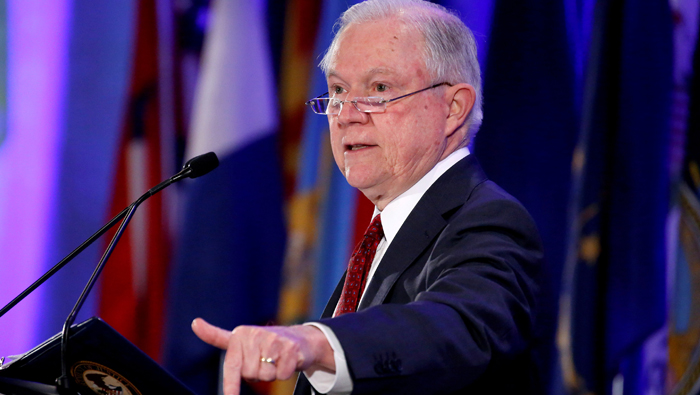
Washington: US Attorney General Jeff Sessions on Saturday blasted the judicial branch of the federal government for freezing many of President Donald Trump's executive orders, including the travel ban and sanctuary city funding.
"All courts are in power to decide specific cases and controversies but they do not have every word on matters of policy. Give me a break," the nation's chief law enforcer told the conservative legal group the Federalist Society.
"The branches that are directly accountable to the people must be given their proper respect," Sessions said, drawing applause from his audience at Georgetown University. Sessions said nationwide injunctions by federal courts are an overstep of judicial power to the legislative and executive bodies. Nationwide injunctions are court rulings that prohibit the government from enforcing laws against anyone in the country before a trial, including those who are not a party to the lawsuit.
Since taking office in January 2017, President Donald Trump's executive orders have been imposed 22 injunctions, including the 2017 travel ban, in which about 100 waivers were denied to thousands of applicants for US visas from the eight countries subject to its restrictions, according to State Department data provided to Reuters.
Trump's decision to cut funding to sanctuary cities and the change of the Obamacare contraceptive-coverage mandate have been held up by injunctions. "These steps are outside proper law," Sessions said. "Just one of 600 federal judges can cause turmoil and disruption to our legal system." Chicago, the nation’s third-largest city, sued Sessions last August for the Justice Department's interference in denying public-safety grants to so-called sanctuary cities that limit cooperation with a federal immigration crackdown.
Chicago attorney Ron Safer argued in a US District Court that Sessions lacked authority to attach conditions that would force Chicago to choose between funding for crime-fighting equipment and programmes, and adopting an unconstitutional policy that would shatter trust with immigrant communities needed to solve crimes.
The court held that Chicago was unlikely to win its argument that its sanctuary policies are constitutionally protected. Two months later, a Philadelphia judge found the opposite might prevail, citing the 10th Amendment’s prohibition on the federal government commandeering state resources.
"This is not a political or a partisan issue,” Sessions said. "It is a constitutional issue and a rule-of-law issue that has been a problem for administrations of both parties.”
Sessions said he hoped the Supreme Court would resolve the issue but earlier this week, he lashed out at a California judge, saying that if the state wants to use every power it has to frustrate the federal government on the issue of funding to sanctuary cities, he would be sure "to use every power I have to stop them.” On Saturday, the attorney general made a more impassioned contradictory appeal in speaking with an audience of future lawyers. "There can be no question that courts should put an end to nationwide injunctions and keep activists on both sides of the aisle from paralyzing the federal government," he said.